What to know about the Morocco earthquake and the efforts to help
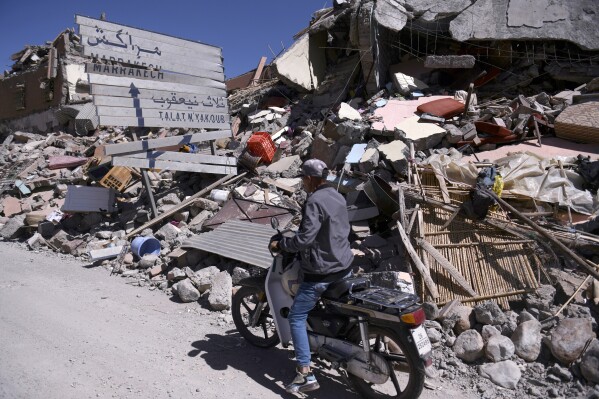
A man on a scooter drives past rubble and a damaged road sign pointing to Marrakech in Talat N’yakoub, Morocco, Monday Sept. 11, 2023. More than 2,000 people were killed, and the toll was expected to rise as rescuers struggled to reach hard-hit remote areas after a powerful earthquake struck Morocco.
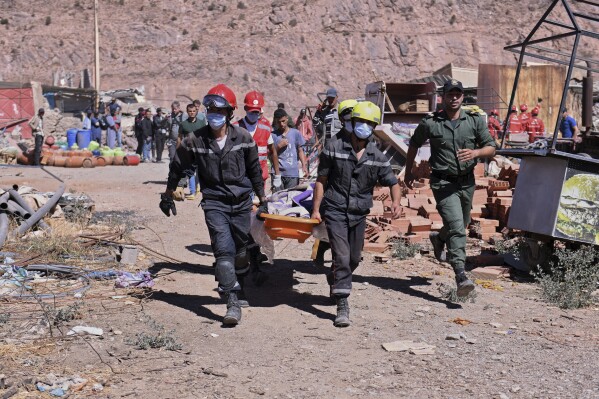
A victim is carried away by rescue workers in Talat N’yakoub, Morocco, Monday Sept. 11, 2023. More than 2,000 people were killed, and the toll was expected to rise as rescuers struggled to reach hard-hit remote areas after a powerful earthquake struck Morocco.
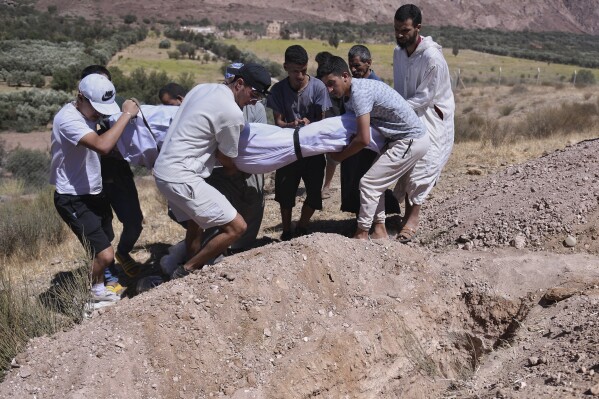
A victim covered in a sheet is carried to a grave that has just been dug in Talat N’yakoub, Morocco, Monday Sept. 11, 2023. More than 2,000 people were killed, and the toll was expected to rise as rescuers struggled to reach hard-hit remote areas after a powerful earthquake struck Morocco
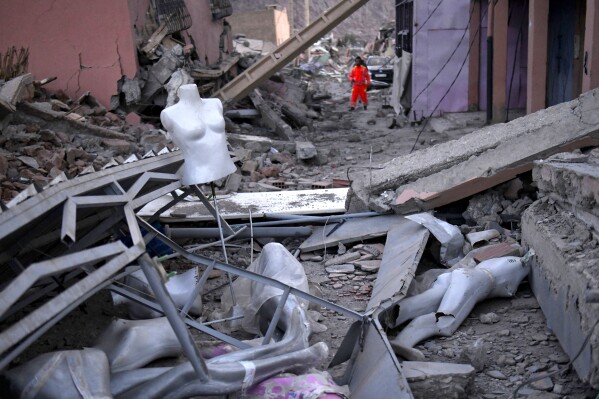
Mannequins are strewn across the rubble in Talat N’yakoub, Morocco, Monday Sept. 11, 2023. More than 2,000 people were killed, and the toll was expected to rise as rescuers struggled to reach hard-hit remote areas after a powerful earthquake struck Morocco.
A man on a scooter drives past rubble and a damaged road sign pointing to Marrakech in Talat N’yakoub, Morocco, Monday Sept. 11, 2023. More than 2,000 people were killed, and the toll was expected to rise as rescuers struggled to reach hard-hit remote areas after a powerful earthquake struck Morocco.
A victim is carried away by rescue workers in Talat N’yakoub, Morocco, Monday Sept. 11, 2023. More than 2,000 people were killed, and the toll was expected to rise as rescuers struggled to reach hard-hit remote areas after a powerful earthquake struck Morocco.
A victim covered in a sheet is carried to a grave that has just been dug in Talat N’yakoub, Morocco, Monday Sept. 11, 2023. More than 2,000 people were killed, and the toll was expected to rise as rescuers struggled to reach hard-hit remote areas after a powerful earthquake struck Morocco
Mannequins are strewn across the rubble in Talat N’yakoub, Morocco, Monday Sept. 11, 2023. More than 2,000 people were killed, and the toll was expected to rise as rescuers struggled to reach hard-hit remote areas after a powerful earthquake struck Morocco.
(Fernando Sanchez/Europa Press via AP)
WHAT ARE THE AREAS MOST AFFECTED?
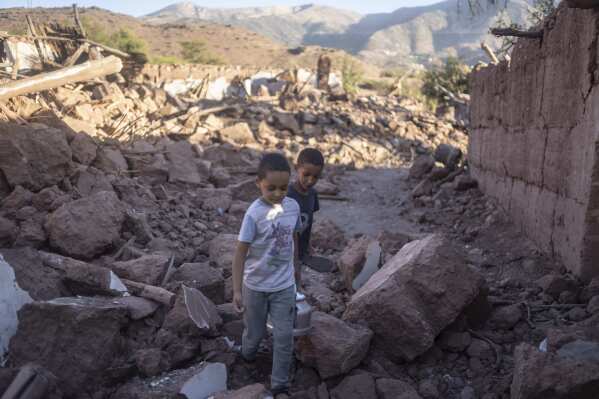
Powerful quake in Morocco kills more than 2,000 people and damages historic buildings in Marrakech
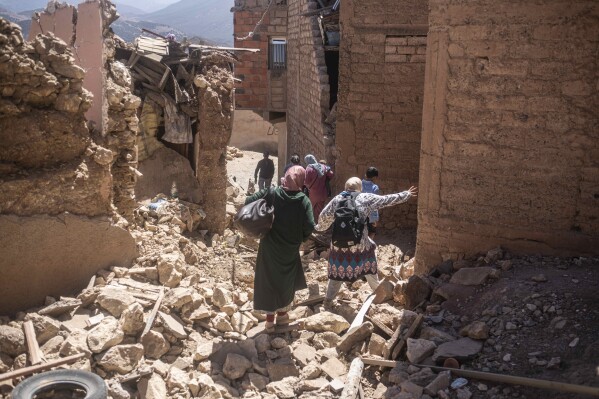
Moroccan villagers mourn after earthquake brings destruction to their rural mountain home
The epicenter was high in the Atlas Mountains, about 70 kilometers (44 miles) south of Marrakech in Al Haouz province.
The region is largely rural — made up of red-rock mountains, picturesque gorges and glistening streams and lakes.
The earthquake shook most of Morocco and caused injury and death in other provinces, including Marrakech, Taroudant and Chichaoua.
WHO WAS AFFECTED?
Of the 2,946 deaths reported as of Wednesday, 1,684 were in Al Haouz, a region with a population of around 570,000, according to Morocco’s 2014 census.
In certain villages such as Tafeghaghte, residents say more than half the population died. The United Nations has estimated that 300,000 people were affected by Friday night’s temblor.
People speak a combination of Arabic and Tachelhit, Morocco’s most common Indigenous language. Villages of clay and mud brick built into mountainsides have been destroyed.
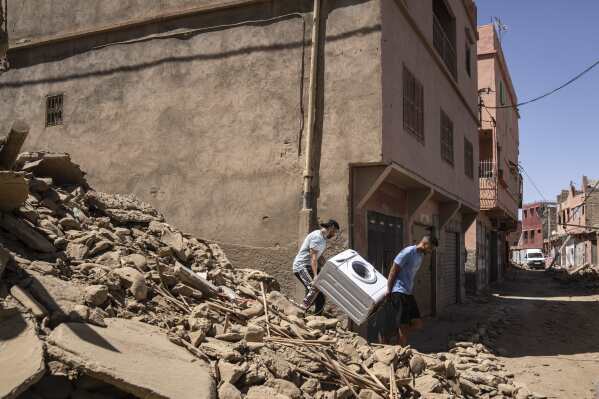
People recover a washing machine from their home that was damaged by the earthquake, in the town of Amizmiz, near Marrakech, Morocco, Sunday, Sept. 10, 2023. An aftershock rattled Moroccans on Sunday as they prayed for victims of the nation’s strongest earthquake in more than a century and toiled to rescue survivors while soldiers and workers brought water and supplies to desperate mountain villages in ruins.
WHO IS PROVIDING AID?
Morocco has deployed ambulances, rescue crews and soldiers to the region to help assist with emergency response efforts.
Aid groups said the government hasn’t made a broad appeal for help and accepted only limited foreign assistance.
The Interior Ministry said that it was accepting search and rescue-focused international aid from nongovernmental organizations as well as Spain, Qatar, the U.K. and the United Arab Emirates, bypassing offers from French President Emmanuel Macron and U.S. President Joe Biden.
The Moroccan government said that poorly coordinated aid “would be counterproductive,” to the frustration of rescue teams.
HOW CAN PEOPLE HELP?
Experts say the most direct way to provide aid to those affected in the city of Marrakech and the rural areas in the Atlas Mountains is to donate to organizations that have operations already on the ground.
That includes the International Federation of Red Cross and Red Crescent Societies, which quickly released $1.1 million from its Disaster Response Emergency Fund to support Moroccan Red Crescent relief efforts in the country.
It also includes World Central Kitchen, Doctors Without Borders, and GlobalGiving, which created a Morocco Earthquake Relief Fund and had raised more than $500,000 as of Tuesday morning.
WHY ARE MARRAKECH AND THE REGION HISTORIC?
The earthquake cracked and crumbled parts of the walls that surround Marrakech’s old city, a UNESCO World Heritage site built in the 12th century.
Videos showed dust emanating from parts of the Koutoubia Mosque, one of the city’s best-known historic sites. The city is Morocco’s most widely visited destination, known for its palaces, spice markets, madrasas and Jemaa El Fna — its noisy square full of food vendors and musicians.
The earthquake also wreaked havoc on significant historical sites in the High Atlas. They include a 12th-century mosque in Tinmel built by the Almohad Dynasty under Ibn Toumert, a 19th-century kasbah built near Talat N’Yakoub and a significant mosque and pilgrimage site in Moulay Brahim.
“While most tourists may know about famous monuments in large cities, smaller villages contain their own monuments that have suffered from marginalization for decades,” said Brahim El Guabli, an Amazigh studies scholar and associate professor of Arabic studies at Williams College. “The entire Moroccan High Atlas is strewn with important historical monuments.”
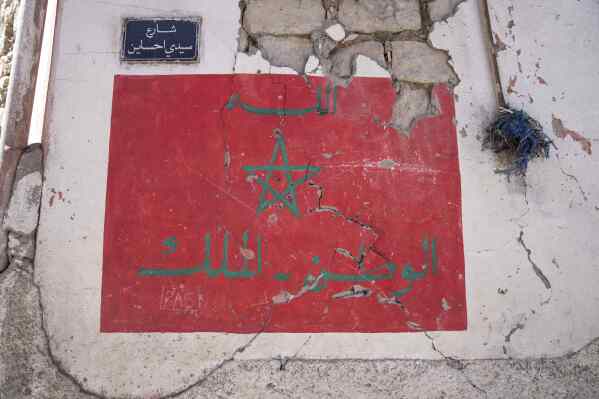
A cracked wall showing Morocco’s flag and a writing in Arabic that reads:" God, the Nation, the King,” in the town of Amizmiz, near Marrakech, Morocco, Sunday, Sept. 10, 2023. Towns and villages throughout Morocco’s Atlas Mountains are mourning the dead and seeking aid after a record earthquake wreaked destruction throughout the region last week.
WHAT ARE THE NEXT STEPS?
Emergency response efforts are likely to continue as teams traverse mountain roads to reach villages hit hardest by the earthquake.
Many communities lack food, water, electricity and shelter. But once aid crews and soldiers leave, the challenges facing hundreds of thousands who call the area home will probably remain.
Members of Morocco’s Parliament convened Monday to create a government fund for earthquake response at the request of King Mohammed VI.
Prime Minister Aziz Akhannouch said afterward that the government was committed to compensating victims and helping them rebuild. Enaam Mayara, the president of Morocco’s House of Councilors, said that it would likely take five or six years to rebuild some affected areas.
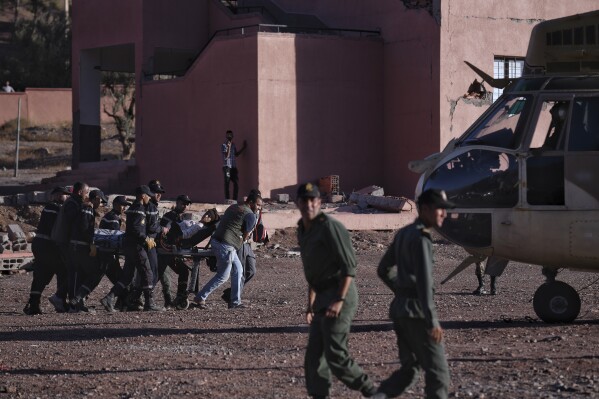
Moroccan soldiers and personnel evacuate a survivor in Talat N’yakoub, Morocco, Monday Sept. 11, 2023. More than 2,000 people were killed, and the toll was expected to rise as rescuers struggled to reach hard-hit remote areas after a powerful earthquake struck Morocco. (Fernando Sanchez/Europa Press via AP)
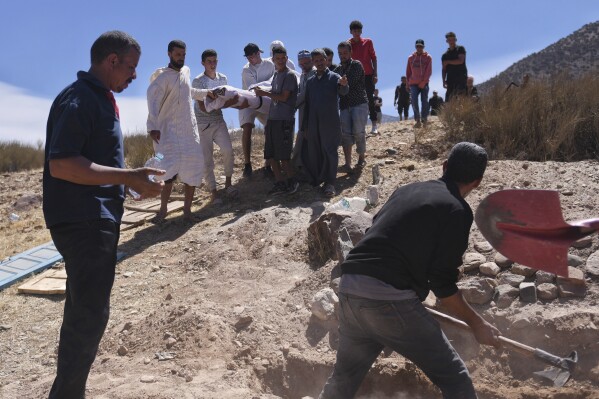
A victim covered in a sheet is carried to a grave that has just been dug in Talat N’yakoub, Morocco, Monday Sept. 11, 2023. More than 2,000 people were killed, and the toll was expected to rise as rescuers struggled to reach hard-hit remote areas after a powerful earthquake struck Morocco. (Fernando Sanchez/Europa Press via AP)

A donkey stands inside a building damaged by the earthquake in the village of Tafeghaghte, near Marrakech, Morocco, Monday, Sept. 11, 2023. Rescue crews expanded their efforts on Monday as the earthquake’s death toll continued to climb to more than 2,400 and displaced people worried about where to find shelter.
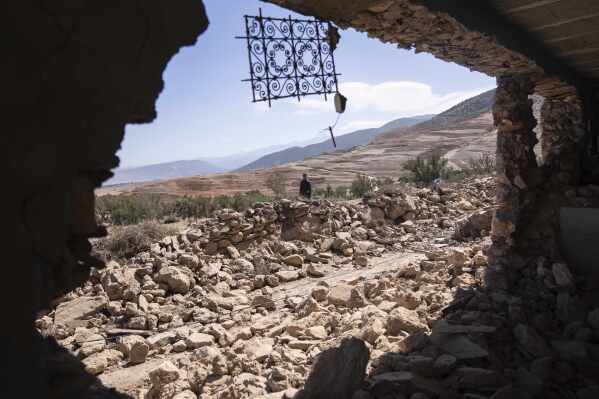
A man walks past rubble caused by the earthquake in the village of Tafeghaghte, near Marrakech, Morocco, Monday, Sept. 11, 2023.
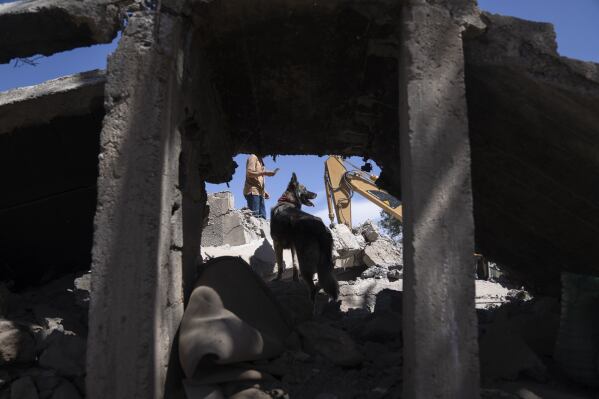
People and dogs dig through the rubble of a home that was damaged by an earthquake, in the village of Tafeghaghte, near Marrakech, Morocco, Monday, Sept. 11, 2023.
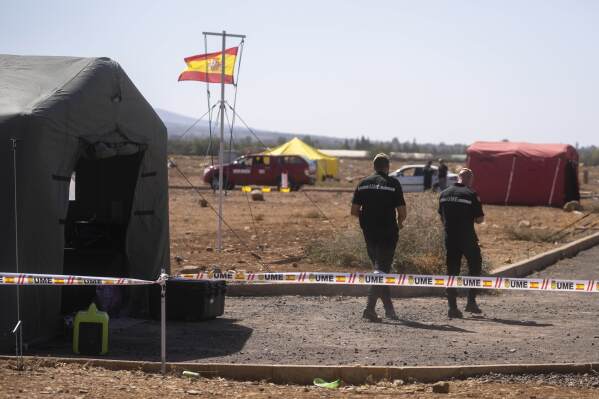
A camp set up by the Spanish Military Emergency Unit to assist with the rescue mission for victims of the earthquake, in the town of Amizmiz, near Marrakech, Morocco, Monday, Sept. 11, 2023. Rescue crews expanded their efforts on Monday as the earthquake’s death toll continued to climb to more than 2,400 and displaced people worried about where to find shelter.
___
Jesse Bedayn in Denver, Angela Charlton in Paris, Glenn Gamboa in New York, and Will Weissert in Washington, contributed to this report.
BY SAM METZ
September 13, 2023
AMIZMIZ, Morocco (AP) — An earthquake has sown destruction and devastation in Morocco, where death and injury counts continue to rise after rescue crews dug out people both alive and dead in villages that were reduced to rubble.
Law enforcement and aid workers — both Moroccan and international — have arrived in the region south of the city of Marrakech that was hardest hit by the magnitude 6.8 tremor Friday night, along with several aftershocks.
Residents in most places have been provided food and water, and most of the giant boulders blocking steep mountain roads have been cleared. But worries remain about shelter and long-term recovery efforts in impoverished mountain regions hardest hit.
Here’s what you need to know:
September 13, 2023
AMIZMIZ, Morocco (AP) — An earthquake has sown destruction and devastation in Morocco, where death and injury counts continue to rise after rescue crews dug out people both alive and dead in villages that were reduced to rubble.
Law enforcement and aid workers — both Moroccan and international — have arrived in the region south of the city of Marrakech that was hardest hit by the magnitude 6.8 tremor Friday night, along with several aftershocks.
Residents in most places have been provided food and water, and most of the giant boulders blocking steep mountain roads have been cleared. But worries remain about shelter and long-term recovery efforts in impoverished mountain regions hardest hit.
Here’s what you need to know:
WHAT ARE THE AREAS MOST AFFECTED?
Powerful quake in Morocco kills more than 2,000 people and damages historic buildings in Marrakech
Moroccan villagers mourn after earthquake brings destruction to their rural mountain home
The epicenter was high in the Atlas Mountains, about 70 kilometers (44 miles) south of Marrakech in Al Haouz province.
The region is largely rural — made up of red-rock mountains, picturesque gorges and glistening streams and lakes.
The earthquake shook most of Morocco and caused injury and death in other provinces, including Marrakech, Taroudant and Chichaoua.
WHO WAS AFFECTED?
Of the 2,946 deaths reported as of Wednesday, 1,684 were in Al Haouz, a region with a population of around 570,000, according to Morocco’s 2014 census.
In certain villages such as Tafeghaghte, residents say more than half the population died. The United Nations has estimated that 300,000 people were affected by Friday night’s temblor.
People speak a combination of Arabic and Tachelhit, Morocco’s most common Indigenous language. Villages of clay and mud brick built into mountainsides have been destroyed.
People recover a washing machine from their home that was damaged by the earthquake, in the town of Amizmiz, near Marrakech, Morocco, Sunday, Sept. 10, 2023. An aftershock rattled Moroccans on Sunday as they prayed for victims of the nation’s strongest earthquake in more than a century and toiled to rescue survivors while soldiers and workers brought water and supplies to desperate mountain villages in ruins.
(AP Photo/Mosa’ab Elshamy)
Most of the dead have already been buried. The government reports 2,501 injuries.
Most of the dead have already been buried. The government reports 2,501 injuries.
WHO IS PROVIDING AID?
Morocco has deployed ambulances, rescue crews and soldiers to the region to help assist with emergency response efforts.
Aid groups said the government hasn’t made a broad appeal for help and accepted only limited foreign assistance.
The Interior Ministry said that it was accepting search and rescue-focused international aid from nongovernmental organizations as well as Spain, Qatar, the U.K. and the United Arab Emirates, bypassing offers from French President Emmanuel Macron and U.S. President Joe Biden.
The Moroccan government said that poorly coordinated aid “would be counterproductive,” to the frustration of rescue teams.
HOW CAN PEOPLE HELP?
Experts say the most direct way to provide aid to those affected in the city of Marrakech and the rural areas in the Atlas Mountains is to donate to organizations that have operations already on the ground.
That includes the International Federation of Red Cross and Red Crescent Societies, which quickly released $1.1 million from its Disaster Response Emergency Fund to support Moroccan Red Crescent relief efforts in the country.
It also includes World Central Kitchen, Doctors Without Borders, and GlobalGiving, which created a Morocco Earthquake Relief Fund and had raised more than $500,000 as of Tuesday morning.
WHY ARE MARRAKECH AND THE REGION HISTORIC?
The earthquake cracked and crumbled parts of the walls that surround Marrakech’s old city, a UNESCO World Heritage site built in the 12th century.
Videos showed dust emanating from parts of the Koutoubia Mosque, one of the city’s best-known historic sites. The city is Morocco’s most widely visited destination, known for its palaces, spice markets, madrasas and Jemaa El Fna — its noisy square full of food vendors and musicians.
The earthquake also wreaked havoc on significant historical sites in the High Atlas. They include a 12th-century mosque in Tinmel built by the Almohad Dynasty under Ibn Toumert, a 19th-century kasbah built near Talat N’Yakoub and a significant mosque and pilgrimage site in Moulay Brahim.
“While most tourists may know about famous monuments in large cities, smaller villages contain their own monuments that have suffered from marginalization for decades,” said Brahim El Guabli, an Amazigh studies scholar and associate professor of Arabic studies at Williams College. “The entire Moroccan High Atlas is strewn with important historical monuments.”
A cracked wall showing Morocco’s flag and a writing in Arabic that reads:" God, the Nation, the King,” in the town of Amizmiz, near Marrakech, Morocco, Sunday, Sept. 10, 2023. Towns and villages throughout Morocco’s Atlas Mountains are mourning the dead and seeking aid after a record earthquake wreaked destruction throughout the region last week.
(AP Photo/Mosa’ab Elshamy)
HOW DOES THIS COMPARE TO OTHER QUAKES?
Friday’s earthquake was Morocco’s strongest in more than a century.
Although such powerful tremors are rare, it isn’t the country’s deadliest: Just over 60 years ago, Morocco was rocked by a magnitude-5.8 quake that killed over 12,000 people on its western coast, crumbling the city of Agadir, southwest of Marrakech.
That quake prompted changes in construction rules in Morocco, but many buildings — especially rural homes — aren’t built to withstand such force.
There hadn’t been any earthquakes stronger than magnitude 6.0 within 310 miles (500 kilometers) of Friday’s tremor in at least a century, according to the U.S. Geological Survey. Northern Morocco experiences earthquakes more often, including tremors of magnitude 6.4 in 2004 and magnitude 6.3 in 2016.
Elsewhere this year, a magnitude 7.8 temblor that shook Syria and Turkey killed more than 50,000 people. Most of the most devastating earthquakes in recent history have been above magnitude 7.0, including a 2015 tremor in Nepal that killed more than 8,800 people and a 2008 quake that killed 87,500 in China.
HOW DOES THIS COMPARE TO OTHER QUAKES?
Friday’s earthquake was Morocco’s strongest in more than a century.
Although such powerful tremors are rare, it isn’t the country’s deadliest: Just over 60 years ago, Morocco was rocked by a magnitude-5.8 quake that killed over 12,000 people on its western coast, crumbling the city of Agadir, southwest of Marrakech.
That quake prompted changes in construction rules in Morocco, but many buildings — especially rural homes — aren’t built to withstand such force.
There hadn’t been any earthquakes stronger than magnitude 6.0 within 310 miles (500 kilometers) of Friday’s tremor in at least a century, according to the U.S. Geological Survey. Northern Morocco experiences earthquakes more often, including tremors of magnitude 6.4 in 2004 and magnitude 6.3 in 2016.
Elsewhere this year, a magnitude 7.8 temblor that shook Syria and Turkey killed more than 50,000 people. Most of the most devastating earthquakes in recent history have been above magnitude 7.0, including a 2015 tremor in Nepal that killed more than 8,800 people and a 2008 quake that killed 87,500 in China.
WHAT ARE THE NEXT STEPS?
Emergency response efforts are likely to continue as teams traverse mountain roads to reach villages hit hardest by the earthquake.
Many communities lack food, water, electricity and shelter. But once aid crews and soldiers leave, the challenges facing hundreds of thousands who call the area home will probably remain.
Members of Morocco’s Parliament convened Monday to create a government fund for earthquake response at the request of King Mohammed VI.
Prime Minister Aziz Akhannouch said afterward that the government was committed to compensating victims and helping them rebuild. Enaam Mayara, the president of Morocco’s House of Councilors, said that it would likely take five or six years to rebuild some affected areas.
Moroccan soldiers and personnel evacuate a survivor in Talat N’yakoub, Morocco, Monday Sept. 11, 2023. More than 2,000 people were killed, and the toll was expected to rise as rescuers struggled to reach hard-hit remote areas after a powerful earthquake struck Morocco. (Fernando Sanchez/Europa Press via AP)
A victim covered in a sheet is carried to a grave that has just been dug in Talat N’yakoub, Morocco, Monday Sept. 11, 2023. More than 2,000 people were killed, and the toll was expected to rise as rescuers struggled to reach hard-hit remote areas after a powerful earthquake struck Morocco. (Fernando Sanchez/Europa Press via AP)
A donkey stands inside a building damaged by the earthquake in the village of Tafeghaghte, near Marrakech, Morocco, Monday, Sept. 11, 2023. Rescue crews expanded their efforts on Monday as the earthquake’s death toll continued to climb to more than 2,400 and displaced people worried about where to find shelter.
A man walks past rubble caused by the earthquake in the village of Tafeghaghte, near Marrakech, Morocco, Monday, Sept. 11, 2023.
People and dogs dig through the rubble of a home that was damaged by an earthquake, in the village of Tafeghaghte, near Marrakech, Morocco, Monday, Sept. 11, 2023.
A camp set up by the Spanish Military Emergency Unit to assist with the rescue mission for victims of the earthquake, in the town of Amizmiz, near Marrakech, Morocco, Monday, Sept. 11, 2023. Rescue crews expanded their efforts on Monday as the earthquake’s death toll continued to climb to more than 2,400 and displaced people worried about where to find shelter.
(AP Photo/Mosa’ab Elshamy)
Jesse Bedayn in Denver, Angela Charlton in Paris, Glenn Gamboa in New York, and Will Weissert in Washington, contributed to this report.
Cathrin Schaer
DW
Was it politics that stopped Morocco from accepting offers of international help after a deadly earthquake? Guidelines on international disaster response mean there's much more to it than that.
Over 2,800 people have died after the Moroccan earthquake and thousands more are injured and homeless
Nacho Doce/REUTERS
The videos on social media are hard to watch. "There is nobody here to help us," an older man in a village near the Tizi N'Test pass in Morocco's Atlas Mountains angrily cries. All around him, red dirt and rubble where houses used to stand, all destroyed by the earthquake that hit the area last Friday night.
He, his son and five others were trying to rescue neighbors from under collapsed buildings, he tells the cameraman, who will eventually publish the video on YouTube.
"Many victims just lay under the ruins until they died," the man said.
"There's nobody here," a woman yells in another video posted on Instagram. "No tents, no other accommodation … we are just living on donations. Where are the officials?"
These cries for help have led Moroccans to question their own government. They are asking why it has so far only accepted help from four countries — the United Arab Emirates, Spain, Qatar and the UK — following the earthquake that killed over 2,800 people. Offers from around 60 other countries have not been accepted.
That has led to international headlines and even caused the French and German governments to publicly deny that Morocco's rejection of their offers to help was political. Moroccan officials have themselves expressed irritation over the controversy and said the French are treating them as though they are backward, the French newspaper, Le Monde, reported this week.
As a sovereign country, Morocco is "the master of its choices, which must be respected," French Foreign Minister Catherine Colonna said during an interview amid speculation that the unhappy state of diplomatic relations between the two nations was causing Morocco to reject aid from France. This is "a completely inappropriate quarrel," Colonna said.
The videos on social media are hard to watch. "There is nobody here to help us," an older man in a village near the Tizi N'Test pass in Morocco's Atlas Mountains angrily cries. All around him, red dirt and rubble where houses used to stand, all destroyed by the earthquake that hit the area last Friday night.
He, his son and five others were trying to rescue neighbors from under collapsed buildings, he tells the cameraman, who will eventually publish the video on YouTube.
"Many victims just lay under the ruins until they died," the man said.
"There's nobody here," a woman yells in another video posted on Instagram. "No tents, no other accommodation … we are just living on donations. Where are the officials?"
These cries for help have led Moroccans to question their own government. They are asking why it has so far only accepted help from four countries — the United Arab Emirates, Spain, Qatar and the UK — following the earthquake that killed over 2,800 people. Offers from around 60 other countries have not been accepted.
That has led to international headlines and even caused the French and German governments to publicly deny that Morocco's rejection of their offers to help was political. Moroccan officials have themselves expressed irritation over the controversy and said the French are treating them as though they are backward, the French newspaper, Le Monde, reported this week.
As a sovereign country, Morocco is "the master of its choices, which must be respected," French Foreign Minister Catherine Colonna said during an interview amid speculation that the unhappy state of diplomatic relations between the two nations was causing Morocco to reject aid from France. This is "a completely inappropriate quarrel," Colonna said.

Spain is one of four countries sending rescuers into Morocco — the two nations have a good relationship
Experts in the field of disaster response agree: While it is true that international rescue efforts are always political in some way, they are also complicated, involving dozens of different actors, and also highly dependent on other circumstances as well.
Ideally, international rescue efforts are meant to be informed by a set of guidelines developed by the Red Cross and Red Crescent between 2001 and 2007. These deal with some of the issues that have hampered international rescue operations in the past. They also state that any disaster response should always begin with domestic efforts and that international rescuers should only enter the country when invited.
How to get an invitation to help?
Firstly, there is a difference between private organizations, non-governmental organizations and charities, and state-funded ones, like the rescue team from Germany's Federal Agency for Technical Relief.

After the February earthquake, German NGOs, like Deathcare, made their way into Turkey earlier this year
Ozan Kose/AFP/Getty Images
It depends on the situation, but private groups may get started without an invitation. For example, because Europeans can get a visa on arrival for Morocco and the airport was safe and open, Medecins Sans Frontieres (MSF), also known as Doctors Without Borders, was able to send some people to Morocco on Saturday.
They travel as private citizens, explained Christian Katzer, director of MSF Germany, "and they are mainly there to quickly assess the situation to see if there is a need for our help."
MSF focuses on medical services and staff gauge how Moroccan health services are coping.
"If we identify a gap, then we switch to official channels," Katzer told DW. "We would liaise with a government body to get permission to come in and begin work officially."
It's a different case for state-funded organizations and bodies like the United Nations Office for the Coordination of Humanitarian Affairs (OCHA). These adhere to international rules about state sovereignty and cannot enter without an invitation. But bodies like OCHA — which plays a major role in international emergency response — often already have employees in the country.
Earthquake in Morocco: Desperate search for the missing
Following the devastating earthquake in Morocco, the feverish search for the missing continues. But the chances of uncovering survivors fade by the hour.
It depends on the situation, but private groups may get started without an invitation. For example, because Europeans can get a visa on arrival for Morocco and the airport was safe and open, Medecins Sans Frontieres (MSF), also known as Doctors Without Borders, was able to send some people to Morocco on Saturday.
They travel as private citizens, explained Christian Katzer, director of MSF Germany, "and they are mainly there to quickly assess the situation to see if there is a need for our help."
MSF focuses on medical services and staff gauge how Moroccan health services are coping.
"If we identify a gap, then we switch to official channels," Katzer told DW. "We would liaise with a government body to get permission to come in and begin work officially."
It's a different case for state-funded organizations and bodies like the United Nations Office for the Coordination of Humanitarian Affairs (OCHA). These adhere to international rules about state sovereignty and cannot enter without an invitation. But bodies like OCHA — which plays a major role in international emergency response — often already have employees in the country.
Earthquake in Morocco: Desperate search for the missing
Following the devastating earthquake in Morocco, the feverish search for the missing continues. But the chances of uncovering survivors fade by the hour.
Image: PHILIPPE LOPEZ/AFP

Searching for survivors
Amid the dust and rubble, these emergency workers in Amizmiz, Morocco, look for survivors. Four days after the most powerful earthquake in decades, authorities have reported over 2,800 dead and thousands of people are still missing. The earthquake could also be felt in nearby countries, including Portugal and Algeria.
Image: Nacho Doce/REUTERS
In a background briefing, an OCHA staff member explained to DW that when disaster strikes, members of OCHA's emergency response team are notified on their mobile phones. They then log into an online platform to coordinate any efforts.
Elsewhere, UN representatives inside the impacted country are already establishing contact with the government to offer help. This usually happens very quickly. There's no single hotline to call to ask the UN for help, but there are usually locals working in disaster management who know where to enquire with OCHA.
At the same time, what is known as the International Search and Rescue Advisory Group, or INSARAG, is kicking into action. The group has 90 member countries and coordinates 57 specialized urban search and rescue teams. Morocco has had an INSARAG-accredited rescue team since 2014 and local rescue workers had to take an exam lasting around 70 hours before being allowed to participate.
The international teams are directed by OCHA and will typically be standing by at an airport within hours, waiting to see if their offer of help has been accepted. Everyone involved keeps in touch via OCHA's online coordination platform so they can deploy as quickly as possible.

Elsewhere, UN representatives inside the impacted country are already establishing contact with the government to offer help. This usually happens very quickly. There's no single hotline to call to ask the UN for help, but there are usually locals working in disaster management who know where to enquire with OCHA.
At the same time, what is known as the International Search and Rescue Advisory Group, or INSARAG, is kicking into action. The group has 90 member countries and coordinates 57 specialized urban search and rescue teams. Morocco has had an INSARAG-accredited rescue team since 2014 and local rescue workers had to take an exam lasting around 70 hours before being allowed to participate.
The international teams are directed by OCHA and will typically be standing by at an airport within hours, waiting to see if their offer of help has been accepted. Everyone involved keeps in touch via OCHA's online coordination platform so they can deploy as quickly as possible.

Morocco's military have been leading rescue efforts
Jean-Baptiste Quentin/dpa/MAXPPP/picture alliance
What aid offers are accepted? It depends.
Which offers of help are accepted comes down to a variety of factors.
It can depend on the disaster itself. For example, how widespread is the damage? Have hospitals been impacted or are health care and rescue workers among the dead? Is there an option for domestic emergency services to take control?
In the case of the February earthquake in Turkey and Syria that killed around 50,000 people, the Turkish government activated INSARAG's multilateral system within hours. In the end, 49 of 57 teams entered the country, fielding around 3,500 people plus rescue dogs.
After Friday's earthquake, Morocco dispatched its own military to help victims and explained that it didn't want too many international rescue teams because it might lead to a "counterproductive" lack of coordination. In 2004, after a smaller Moroccan earthquake, aid flights reportedly jammed local airports and rescue teams damaged roads. This week, it is already proving difficult for rescuers to traverse small, unpaved and now-damaged roads into the worst-affected mountain villages.
Political considerations also influence aid decisions
Invitations are certainly also political. For example, countries may have bilateral agreements to aid one another in an emergency. There are also regional agreements. For instance, Europe has the EU Civil Protection Mechanism and ASEAN, the Association of Southeast Asian Nations, has a similar agreement.
Of course, there can also be more problematic politics at play. In February, the fact that the UN delayed earthquake aid efforts in Syria because it was waiting for an invitation from the country's brutal dictator, Bashar Assad, may well have cost more lives.
After the 2011 earthquake in Japan, the Asian nation only accepted help from 24 states and regions even though 163 offered help, one researcher noted in 2014. Internal politics played a part, critics said, and Japan was already well known for bureaucratic delays when it came to allowing foreign teams in. Two days after the 2011 earthquake, Swiss rescuers, who were among the first to arrive, were still waiting for permission to import their search and rescue dogs.

Japan in 2011: The country already had a long history of bureaucracy slowing foreign rescue effort
Toshifumi Kitamura/AFP/Getty Images
However, despite headlines about whether Morocco should be accepting more international aid, most experts with contacts in the field right now are reluctant to criticize Rabat and would only speak off the record about this.
"There are extreme examples," one expert on disaster response explained, "where a government would rather not collaborate with aid organizations and would rather leave their people in misery. In some cases there is also a reticence to request assistance because there is a belief that would make the state look weak."
But this is more the case in extremely authoritarian states, experts noted. In fact, they expect more aid organizations to be able to enter Morocco in the near future after the initial emergency response ends.
Right now though, it is still impossible to say how well Morocco has dealt with the earthquake, said Kirsten Bookmiller, an American professor of government, policy and law and an expert in emergency management at Millersville University in Pennsylvania. "We've had somewhat of an information shortfall here, so it's hard to determine as an external observer," she told DW.
Additionally in situations like this, nobody comes out looking good, the experts all agreed.
"A rescue response will never be fast enough for those devastated by the disaster and seeking to keep their loved ones alive," Bookmiller concluded. For them, "any lost moment is one moment too long."
With additional reporting by Tarek Anegay.
Edited by: Sean Sinico
However, despite headlines about whether Morocco should be accepting more international aid, most experts with contacts in the field right now are reluctant to criticize Rabat and would only speak off the record about this.
"There are extreme examples," one expert on disaster response explained, "where a government would rather not collaborate with aid organizations and would rather leave their people in misery. In some cases there is also a reticence to request assistance because there is a belief that would make the state look weak."
But this is more the case in extremely authoritarian states, experts noted. In fact, they expect more aid organizations to be able to enter Morocco in the near future after the initial emergency response ends.
Right now though, it is still impossible to say how well Morocco has dealt with the earthquake, said Kirsten Bookmiller, an American professor of government, policy and law and an expert in emergency management at Millersville University in Pennsylvania. "We've had somewhat of an information shortfall here, so it's hard to determine as an external observer," she told DW.
Additionally in situations like this, nobody comes out looking good, the experts all agreed.
"A rescue response will never be fast enough for those devastated by the disaster and seeking to keep their loved ones alive," Bookmiller concluded. For them, "any lost moment is one moment too long."
With additional reporting by Tarek Anegay.
Edited by: Sean Sinico
‘Everything comes back’: Morocco quake leaves mental scars
By AFP
September 12, 2023

In remote villages like Asni, many survivors of the devastating quake are already grappling with post-traumatic stress
Anne-Sophie LABADIE
When Khadija Temera, a survivor of Morocco’s devastating earthquake, was sent to a psychiatrist on Tuesday, she was just one of a hundred newly traumatised patients who would be seen within 24 hours.
The powerful quake last Friday killed more than 2,900 people, most of them in remote villages of the High Atlas Mountains.
Beyond the physical devastation, soldiers and aid workers say it is becoming increasing clear that many of the survivors are facing severe mental suffering.
“The most important thing is that we are alive,” Temera says, her henna-stained fingers fiddling with a piece of paper, her eyes swollen with tears.
But now she wants to “heal her heart”, and on Tuesday she had her first consultation with a psychiatrist, seeking balm for the trauma inflicted by the quake.
She had first gone to see a regular doctor for hypertension.
But Moroccan troops in the area quickly referred her to the psychiatrist, who said he had seen around a hundred patients since the previous day out of the 500 who came to the field hospital in Asni, around 90 kilometres (55 miles) south of the tourist hub of Marrakesh.
Flashbacks from the fateful day continue to haunt Temera: of stairs collapsing and trapping her and the nine members of her family before they could be rescued.
“I’ve been awake ever since, I can’t fall asleep — as soon as I lie down everything comes back,” said the 68-year-old from the village of Lareb.
– ‘Acute stress’ –
Next to her on a bench, a mute woman was also waiting for a consultation, her hands clasped across her chest and breathing heavily.
She has lost both her children.
After her comes the turn of a man in his thirties, his eyes red from crying.
Of the thousands injured in the powerful earthquake, “some were not only wounded and bruised in their flesh, they were also often ‘bereaved’, having lost their homes”, said Adil Akanour, the only psychiatrist at the makeshift hospital, which was opened to the press on Tuesday.
Meanwhile villagers in more isolated hamlets, which have remained inaccessible, told AFP of their isolation and the absence of aid.
Survivors find themselves in a “state of acute stress with symptoms, often physical at first”, Akanour said, adding that dizziness, palpitations, headaches and abdominal pain can be symptoms that “hide” a psychological problem.
According to the World Health Organization, nearly everyone who experiences such an emergency will suffer some psychological problems which, in most cases, will fade with time.
– ‘There’s nothing left’ –
The separation of families, insecurity, loss of livelihoods and disruption of social contacts are all potential psychological problems, according to the UN organisation, which recommends urgent care to prevent the development of post-traumatic stress disorders.
The 6.8-magnitude quake that struck on September 8 was the most powerful ever recorded in the kingdom, with the provisional toll of 2,900 people dead likely to rise.
Entire villages were swallowed up, and with them the lives of hundreds of modest families.
Thousands of people were left homeless, the majority now living alone in makeshift tents or, for a few such as Mouhamed El Makhconi, sheltering in genuine windproof tents provided by the interior ministry.
“I was the only one providing for my family,” the 60-year old said with a resigned, toothless smile.
He did so by selling jewellery to tourists heading to the summits of the High Atlas mountain range that dominates the landscape.
But now “there’s nothing left” of his ground-floor apartment, leaving him and his eight-member family destitute.
“I haven’t even got a dirham on me,” he sighs, sitting outside the tent. He had to be provided with everything from blankets to glasses.
Adding to his desperation are the sounds of the earthquake that remain resonant in his memory.
He too cannot sleep, saying he can still feel the tremors and the waves of fear that went through his body.
But El Makhconi has not consulted a psychiatrist, largely because he needs to sort out his diabetes first.
His grandchildren have not been examined either. They are still terrified at times and miss their toys, including the bendir, a much-loved percussion instrument.
By AFP
September 12, 2023

In remote villages like Asni, many survivors of the devastating quake are already grappling with post-traumatic stress
- Copyright AFP/File Rodrigo BUENDIA
Anne-Sophie LABADIE
When Khadija Temera, a survivor of Morocco’s devastating earthquake, was sent to a psychiatrist on Tuesday, she was just one of a hundred newly traumatised patients who would be seen within 24 hours.
The powerful quake last Friday killed more than 2,900 people, most of them in remote villages of the High Atlas Mountains.
Beyond the physical devastation, soldiers and aid workers say it is becoming increasing clear that many of the survivors are facing severe mental suffering.
“The most important thing is that we are alive,” Temera says, her henna-stained fingers fiddling with a piece of paper, her eyes swollen with tears.
But now she wants to “heal her heart”, and on Tuesday she had her first consultation with a psychiatrist, seeking balm for the trauma inflicted by the quake.
She had first gone to see a regular doctor for hypertension.
But Moroccan troops in the area quickly referred her to the psychiatrist, who said he had seen around a hundred patients since the previous day out of the 500 who came to the field hospital in Asni, around 90 kilometres (55 miles) south of the tourist hub of Marrakesh.
Flashbacks from the fateful day continue to haunt Temera: of stairs collapsing and trapping her and the nine members of her family before they could be rescued.
“I’ve been awake ever since, I can’t fall asleep — as soon as I lie down everything comes back,” said the 68-year-old from the village of Lareb.
– ‘Acute stress’ –
Next to her on a bench, a mute woman was also waiting for a consultation, her hands clasped across her chest and breathing heavily.
She has lost both her children.
After her comes the turn of a man in his thirties, his eyes red from crying.
Of the thousands injured in the powerful earthquake, “some were not only wounded and bruised in their flesh, they were also often ‘bereaved’, having lost their homes”, said Adil Akanour, the only psychiatrist at the makeshift hospital, which was opened to the press on Tuesday.
Meanwhile villagers in more isolated hamlets, which have remained inaccessible, told AFP of their isolation and the absence of aid.
Survivors find themselves in a “state of acute stress with symptoms, often physical at first”, Akanour said, adding that dizziness, palpitations, headaches and abdominal pain can be symptoms that “hide” a psychological problem.
According to the World Health Organization, nearly everyone who experiences such an emergency will suffer some psychological problems which, in most cases, will fade with time.
– ‘There’s nothing left’ –
The separation of families, insecurity, loss of livelihoods and disruption of social contacts are all potential psychological problems, according to the UN organisation, which recommends urgent care to prevent the development of post-traumatic stress disorders.
The 6.8-magnitude quake that struck on September 8 was the most powerful ever recorded in the kingdom, with the provisional toll of 2,900 people dead likely to rise.
Entire villages were swallowed up, and with them the lives of hundreds of modest families.
Thousands of people were left homeless, the majority now living alone in makeshift tents or, for a few such as Mouhamed El Makhconi, sheltering in genuine windproof tents provided by the interior ministry.
“I was the only one providing for my family,” the 60-year old said with a resigned, toothless smile.
He did so by selling jewellery to tourists heading to the summits of the High Atlas mountain range that dominates the landscape.
But now “there’s nothing left” of his ground-floor apartment, leaving him and his eight-member family destitute.
“I haven’t even got a dirham on me,” he sighs, sitting outside the tent. He had to be provided with everything from blankets to glasses.
Adding to his desperation are the sounds of the earthquake that remain resonant in his memory.
He too cannot sleep, saying he can still feel the tremors and the waves of fear that went through his body.
But El Makhconi has not consulted a psychiatrist, largely because he needs to sort out his diabetes first.
His grandchildren have not been examined either. They are still terrified at times and miss their toys, including the bendir, a much-loved percussion instrument.
Aid slow to arrive to quake-hit Moroccan villages
13/09/2023 -
05:14
France 24's Luke Shrago reports from Marrakesh, Morocco, where he says some quake-hit villages have been forced to rely on aid from ordinary Moroccans as government disaster relief efforts fail to arrive.


No comments:
Post a Comment